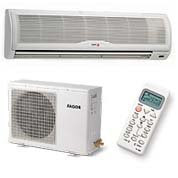by: Daniel Gipe
The average age of an air conditioner is 10 years; some units can run longer than that, some run with a much higher cost after 10 years. If not maintained correctly it can cost you double the operating costs without reducing comfort. Today’s technology has allowed us to achieve better performance without sacrificing efficiency. In fact, today’s models are much cheaper to run than that 10-year-old model gulping up your hard earned money.
I recommend to solve this problem of high energy bills is to upgrade to a Coleman 14 Seer Air Conditioning System through Yours By Design Heating and Cooling.
If for some reason you want to spend more money (up to 40%) than necessary and not buy the upgrade do yourself a favor and
Clean your Air Conditioner before the season begins.
Foreign material on the condenser coil reduces the system's capacity to remove heat from the house so your air conditioning system must run longer, increasing energy (up to 2X) consumption.
Check voltage and amperage on motors
Improper voltage and amperage can reduce significantly the life of the compressor, evaporator and the condenser motor. 80 % of all air conditioner compressor failures could be eliminated if the problems that lead to the failure were corrected.
Check and adjust blower components
Proper adjustment, cleanliness of blower and components are necessary for adequate airflow to assure proper capacity and equipment reliability.
Check condensate drain (clean if necessary)
A clogged drain can create considerable water damage, as well as affect indoor humidity levels.


1 comment:
Central air conditioners have two separate components: the condenser and the evaporator. The condenser unit is usually located outside the house on a concrete slab.
Most central air conditioners are connected to a home's forced-air distribution system. Thus, the same motor, blower, and ductwork used for heating are used to distribute cool air from the air conditioning system. When a central air conditioner is operating, hot air inside the house flows to the furnace through the return-air duct.
split system
Post a Comment